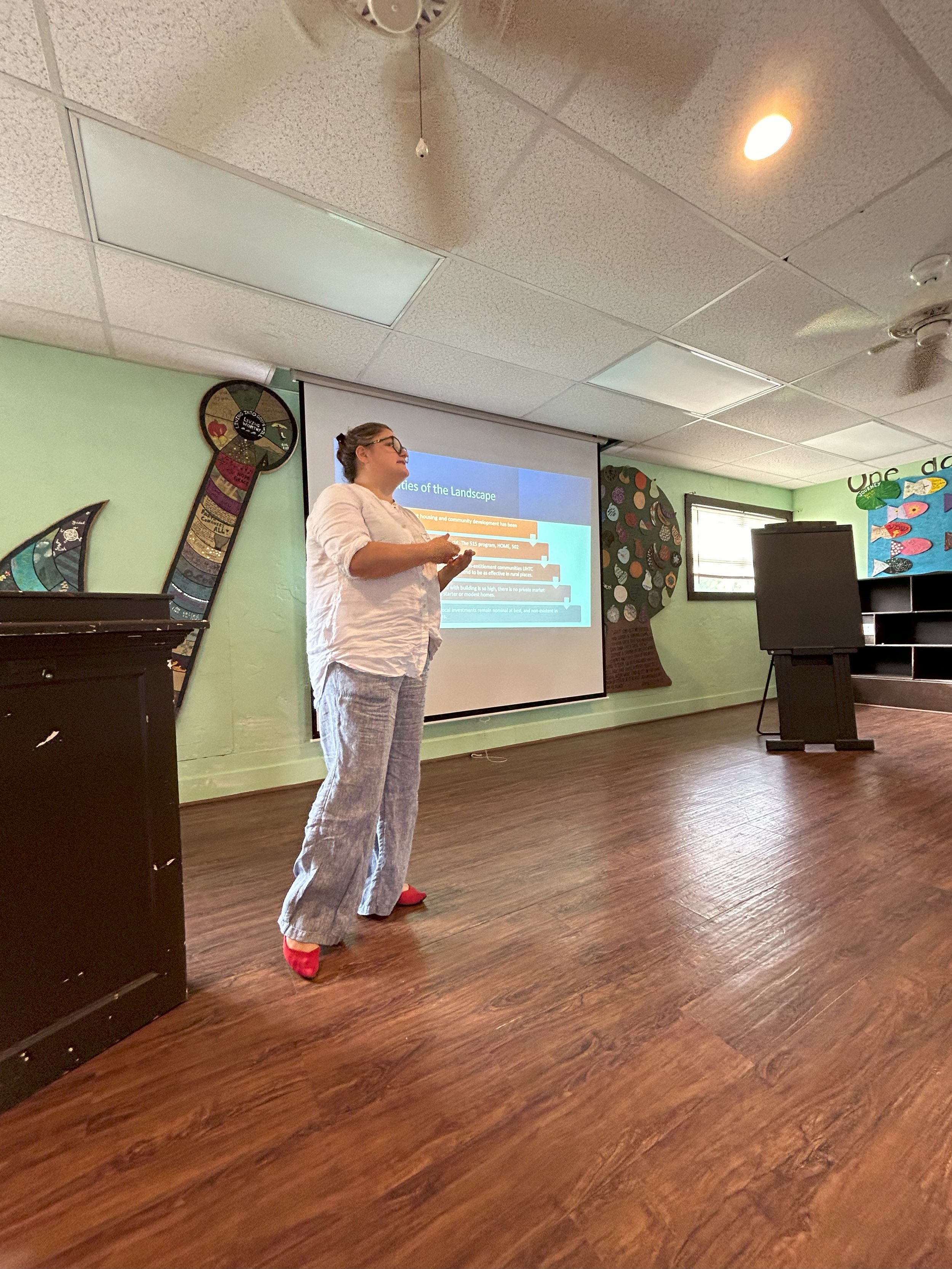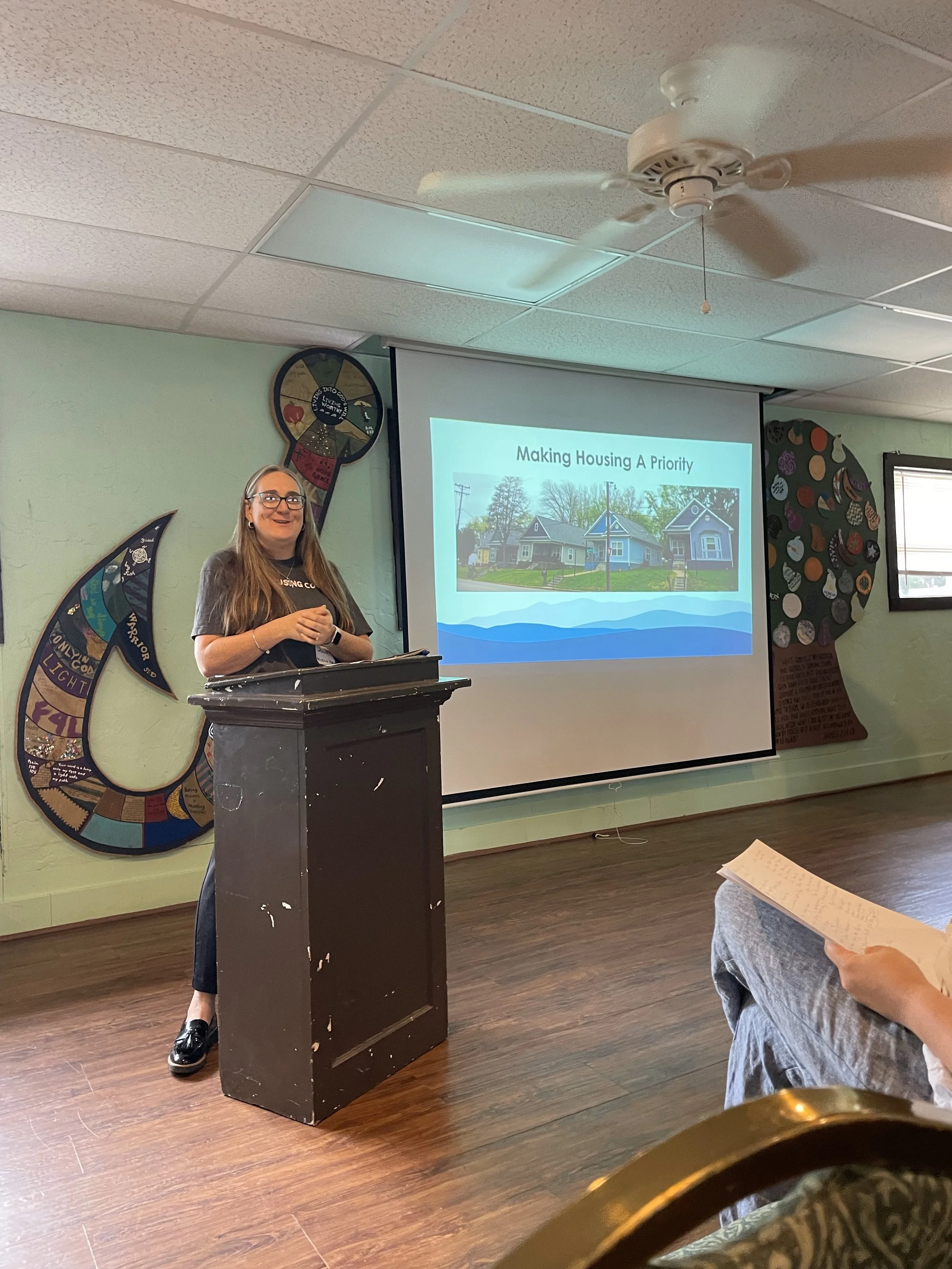South Cumberland Housing Summit, Community Gathers To Focus On Housing
For the third year in a row, the South Cumberland Housing Summit took place on the morning of September 24, 2024, in Grundy County, TN, on the campus of Mountain T.O.P. More than 40 representatives from housing providers, funders, and social service organizations gathered to explore ways to foster rural housing initiatives and meet the needs of aspiring homeowners. The event was planned and led by the Housing Hub and sponsored by the South Cumberland Community Fund.
After a quick round of introductions, the event was kicked off with a presentation from Maggie Riden, Senior Vice President of Advocacy at Fahe in Berea, KY. Armed with regional and local data, Maggie helped us see strategies through which we might better advocate to elected officials and folks in power who struggle with understanding housing innovations. Maggie reminded us to lean into our expertise of solution based collaboration and of telling our very compelling stories about housing in order to draw in the capital necessary to make big moves in addressing housing needs - making the case for housing.
Housing isn’t just a homeowner problem. Housing isn’t just an unhoused problem. Housing impacts everyone.
It was during the question and response time after Maggie’s presentation that folks began buzzing about the potential of their expertise. Eddie Krenson, Vice Chair of the SCCF, commented that paying attention to housing no matter what sector we are working in is a must. “The Housing Summit provided me with the opportunity to realize, for the first time, how vital access to safe, secure, affordable housing is to achieve better health outcomes, higher student achievement, and increase economic development. Thanks to the Housing Summit, I now see housing as the essential foundation upon which we can bring hope and prosperity to the Plateau.”
Jayna Johnson, Homebuyer Education Manager at Tennessee Housing Development Agency in Nashville, TN, addressed the homebuyer education experience. She highlighted the difference between housing counseling and coaching, impressing upon the group the need for both to create a healthy ecosystem for folks navigating through the complexities of finding a home. At Housing Hub, we have seen firsthand the fragmented homebuyer pipeline and just how much work it is for working families to navigate.
After Jayna’s talk, we had a working lunch with Aaron Toran, Director of THDA’s HUD-funded HOME Program and Toni Shaw, Program Manager for the THDA Trust Fund. They both shared details of funding sources available to a wide range of organizations, including local governments.
At the conclusion of each speaker, we had question and response times, during which we heard expressed repeatedly the intersectionality of housing with so many of the indicators of strong communities: education, health, recovery and re-entry, and workforce development. This set us up for the last activity of the summit where we identified some key ideas related to this intersectionality, which reminds us how achieving goals for safe and secure housing for everyone is so complex and needs to be addressed via intentional and fruitful partnerships.
The moderators offered up a few questions to guide our conversations around tables. The last question challenged us to find the smallest next step, and here are the results:
Education - the smallest next step is to think of those who are providing education (teachers, staff, administrators) as well as the families whose children are receiving education both as entities that need information about housing solutions – whether it is rental, preparing for homeownership, or learning about resources for home renovation and restoration that can be shared reciprocally
For teachers, staff and administrators – at Professional Development meetings required of those participating in public education
For families of students who teachers/staff identify as benefiting from additional housing supports
Health - the smallest next step is to create a sharing environment between the housing education information, whether in rental, preparing for homeownership, or resources for renovation and restoration, with the county health councils. Further, collaborate with the health councils to uncover better ways to share housing information.
Recovery and ReEntry: the smallest next step would be to create partnerships between Homeowner Counseling and Homeowner Education Programs with Recovery and Re-Entry programs.
Examples: Utilize THDA-approved Home Counseling and Home Education Programs and other Financial Literacy programs (e.g. BetterFi) as part of the transitional living stages of Recovery/Re-Entry Programs
Workforce Development - the smallest next step would be to create partnerships between Housing Construction non-profits or other relevant housing entities and employers in a local rural area. In the context of the South Cumberland Plateau, this means –
Creating new starter-home or rental units for employees who work locally to live locally
Connecting employers with information about workforce housing opportunities to create a pipeline of construction to known buyers who will be full-time community members to improve recruitment
Engaging Local Government in identifying/securing land to build these housing communities for the relevant workforce being attracted to an area
The challenge of keeping these next smallest steps moving forward has been a part of the conversation as well. The South Cumberland Community Fund’s Community Development Committee has organized itself into working groups around housing, education, transportation, and health, and this would be one place of continuity. Another place would be at the Housing Hub where the project of collecting resources around housing is currently ongoing.
As often our lament, capacity is always a struggle. This is why the Housing Hub was created - to keep drilling down on our housing situation in a focused and collaborative manner to find the places where we can realize impact that becomes scalable. Community member Jack Murrah expressed the impact of the summit in this way, “With the Housing Summit, the new Housing Hub demonstrates powerfully both the nature of the challenge and its determination to take action to address it.”
If you are interested in joining a group working on housing struggles, please contact Julie Keel at julie@housinghubtn.org.












